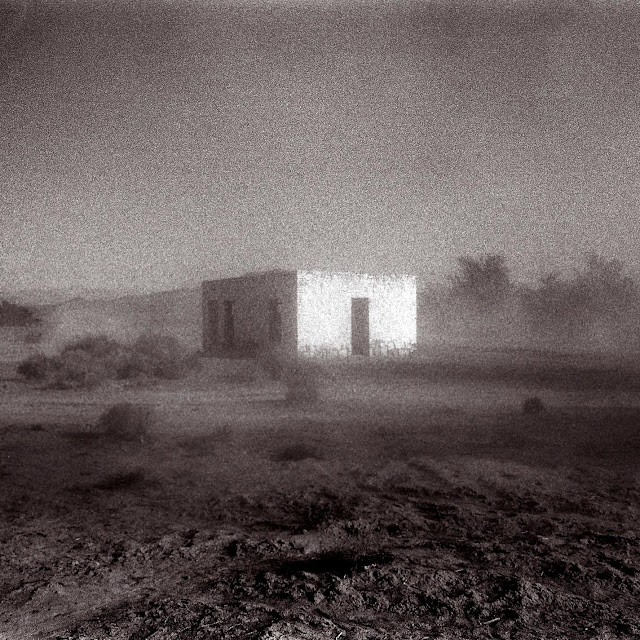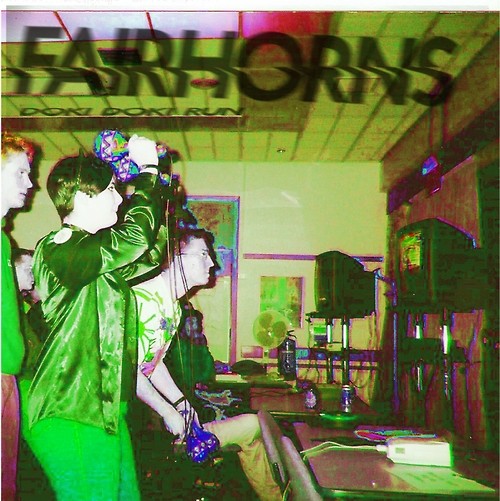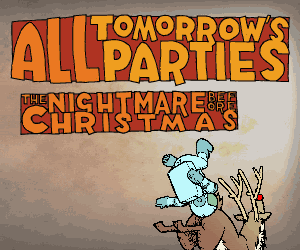
Dots: Whilst the phraseology of supergroup or side-project may kindle a certain degree of attention depending on who may be involved, both seem to have cultivated somewhat negative connotations; connotations that may often be closely linked with a dangerous dosage of scepticism. How have you chosen to approach the project that is Anywhere in that respect, or have such definitions been duly disregarded from the off?
Christian Eric Beaulieu: I found myself making a record with musicians I've admired for years and have been inspired by on many different levels; deep resonant levels so things such as titles or labels that are usually lost anyway on artists due to short attention spans never entered my mind. Most of the process of making a "normal by today's standards" record was altered so radically that the main approach was just making sure it came to fruition.
Dashes: In many ways the record sounds both earthly and otherworldly. Was the Anywhere moniker opted for in reflection of the fact that it could quite conceivably have come from anywhere? I suppose your backgrounds both cultural and geographic are wide-ranging to say the least...
Christian: There are a few ways a band name comes alive. One is that a member has a name before it starts and it takes on a mind of it's own. Another more travelled road is a back and forth method of horrifyingly awful ideas 'til one gets agreed upon when mental fatigue or a lack of original desire sets in, causing desperation to select a possibly unqualified candidate.
When I chose this name I was living in San Francisco, reading SF Beats Bob Kaufman and Michael McClure (who unbeknownst to me at the time lived on the same street) as well as this old Jerry Garcia book called A Signpost To New Space, which was a Rolling Stone interview they couldn't print with an additional "stoned" rap culled from an interview with a Yale Law professor named Charles Reich. So choosing the name Anywhere was more influenced by the flow of words from these gentlemen than of the actual music that at the time was already recorded and almost finished. It later seemed like a good fit...
Dots: One of the prominent strengths of the record is its fidelity I suppose to its in some ways disparate components: you can discernibly detect the influence of each and every contributing musician. Was it always essential to the process to have everyone involved leave their distinctive prints on the final product?
Christian: The players on this record are lifers and have been at their craft for years, hence making it unavoidable that each one has left their "stamp" on it. Indeed it's each "stamp" that brought these folks together for this record in the first place. That said, there were variations on how each player performed for this. From the start when Cedric and I first jammed, I knew it needed to follow a new path of songwriting; one that would be less electric. Both The Mars Volta and my previous band Triclops! are loud, challenging affairs and I thought we needed diversity.
So I purposefully refrained from putting mass amounts of electric guitar onto this record. I also asked Cedric to play the drums instead of focussing on the vocals to make it a fresh experience. And a huge factor in this whole process was Mike Watt recording his parts without the band being in a live setting; something that definitely added to making it a challenge to construct.
Dashes: Was it at times a tale of compromise; of toning down certain people's parts and pieces for the sake of a more thorough coherency?
Christian: This record is the most stripped down music I've recorded in a long time. There was a small amount of compromise with regard to intricate details, but overall the music shaped itself according to a very organic, natural pattern.
Dots: Given the involvement of yourself and Cedric and Mike and Rachel with other acts, how concerted an effort had to be made to ensure enough time was dedicated to the production of the record? And indeed how was it conceived in terms of composition; recording; production?
Christian: I basically had to work with what I could as quickly as possible. This record was created in intervals between everyone's tour schedules. But once I had the drums and acoustics down, I worked with the songs by myself to arrange my parts and move certain moods around. Since Mike and Rachel were emailing in their parts, the engineers and I could work on the record without a timeline. But it did take an increased dosage of patience on my part; more than I've ever taken with anything previous to ensure that it would be properly presentable. Most artists have more than one vision to follow at a time; I routinely have around 3 or 4 different "record ideas" I'm working on at any given moment. So what started to happen was that the more patience I took with Anywhere, new ideas, presentations, and sonic sculptures started blooming. And had they been rushed, the bigger picture the music was trying to convey would've suffered in the end.
Dashes: From a subjective, external viewpoint it's an effort that's perhaps more ethnic (for want of a better word) than some may have anticipated; almost like a cross-pollination of influences Andean, Amazonian and alien. Where do you think this creeping influence came from?
Christian: In 2005 I saw Jack Rose play at Arthur Fest in Los Angeles and consequently I instantly became obsessed with his entire discography. Then the Triclops! dudes turned me on to John Zorn during one of our tours and the first record I bought when I got back home was Electric Masada: At The Mountains of Madness. This led to seeing Secret Chiefs 3 at The Great American Music Hall in SF and after that, while searching for Jimmy Page's White Summer tuning, I accidentally tuned my guitar wrong. Yet it was a tuning I fell in love with and I've been using ever since. From a guitar standpoint these instances make up the foundation for any "Eastern" descriptions of Anywhere's sound.
Dots: One term sure to be linked with the release is that of it being a 'psychedelic' work. The word seems to have been so overused that it's become irredeemably diluted; employed to signify something that's now quite distant from its initial meaning. Firstly what's your interpretation of the bastardisation of the term and more importantly in this era of concise compartmentalisation in which everyone senses a desperate need to know what they're digesting before they sit down to consume, what alternatives would you perhaps use to describe Anywhere to the uninitiated?
Christian: I'm not sure this record will be labeled as psych. Plus true warriors and champions of psych rock will probably consider our record painfully tame. I know I would... There could have been plenty more additives to make it closer to psych certainly. I feel that in these days the term psychedelic applies to whatever is actually moving the game forward and blowing everything apart and that's categorically not quarantined under the umbrella of rock music any more. In actuality machines are the new psychedelic. It started with effects and hasn't relented to progress. Most of us would now sound terrible without a pedal or two...
However there are a lot of bands and writers that require these terms to nurture their identities. And good for them; whatever helps them get on. Not all sailors become captains. I'm not negatively affected by the term psychedelic though. That said, I have no new terminology to help anyone describe Anywhere, which feels good because the music therefore acknowledges it's own independence.
Dashes: Finally, a limited run of the record was of course available for this year's Record Store Day and could be said to have been one of the more lusted after 'exclusives'. What's your personal interpretation of the contemporary significance of vinyl, and were finance and logistics of no relevance how would you dream of your music being unleashed upon the world?
Christian: Well it's great to know that people want to hear this music and I feel very lucky and inspired to have it out there. I've gotten really into buying CD's lately as you can find weird, strange, lost or forgotten stuff in those bins for cheap. It's as with vinyl, but one really great vibe unfolding with the unrelenting resurgence of vinyl is that older folks, your parents' age for instance, can finally buy a new record player and hear their collections that've been dusted over for decades; just waiting to be rediscovered. And that's great. Plus kids growing up in the digital age can become a part of this physical tradition rather than us telling them how things used to be before they ruined it!
I personally do not dream of things unattainable. If the universe shifts and lends a hand in producing additional resources or ideas in order that we may create new music, you just know and follow along as best you can. The music is alive itself and has it's own agenda and if it chooses you at any given moment to channel it, you just hold on, listen and do the best you can.























